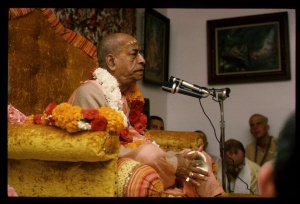SB 7.9.5: Difference between revisions
No edit summary |
No edit summary |
||
| Line 1: | Line 1: | ||
{{info | {{info | ||
|speaker= | |speaker=Nārada Muni | ||
|listener=King | |listener=King Yudhiṣṭhira | ||
}} | }} | ||
[[Category:Srimad-Bhagavatam - Canto 07 Chapter 09|s05 ]] | |||
[[Category:Bhagavatam Verses Spoken by Narada Muni - Vanisource|070905]] | |||
<div style="float:left">'''[[Srimad-Bhagavatam]] - [[SB 7|Seventh Canto]] - [[SB 7.9: Prahlada Pacifies Lord Nrsimhadeva with Prayers|Chapter 9: Prahlāda Pacifies Lord Nṛsiḿhadeva with Prayers]]'''</div> | |||
<div style="float:right">[[File:Go-previous.png|link=SB 7.9.4]] '''[[SB 7.9.4]] - [[SB 7.9.6]]''' [[File:Go-next.png|link=SB 7.9.6]]</div> | |||
{{RandomImage}} | |||
==== TEXT 5 ==== | ==== TEXT 5 ==== | ||
<div | <div class="verse"> | ||
sva-pāda-mūle patitaṁ tam arbhakaṁ | :sva-pāda-mūle patitaṁ tam arbhakaṁ | ||
vilokya devaḥ kṛpayā pariplutaḥ | :vilokya devaḥ kṛpayā pariplutaḥ | ||
utthāpya tac-chīrṣṇy adadhāt karāmbujaṁ | :utthāpya tac-chīrṣṇy adadhāt karāmbujaṁ | ||
kālāhi-vitrasta-dhiyāṁ kṛtābhayam | :kālāhi-vitrasta-dhiyāṁ kṛtābhayam | ||
</div> | </div> | ||
| Line 17: | Line 22: | ||
==== SYNONYMS ==== | ==== SYNONYMS ==== | ||
<div | <div class="synonyms"> | ||
sva-pāda- | ''sva-pāda-mūle''—at His lotus feet; ''patitam''—fallen; ''tam''—him (Prahlāda Mahārāja); ''arbhakam''—only a little boy; ''vilokya''—seeing; ''devaḥ''—Lord Nṛsiṁhadeva; ''kṛpayā''—out of His causeless mercy; ''pariplutaḥ''—very much afflicted (in ecstasy); ''utthāpya''—raising; ''tat-śīrṣṇi''—on his head; ''adadhāt''—placed; ''kara-ambujam''—His lotus hand; ''kāla-ahi''—of the deadly snake of time, (which can cause immediate death); ''vitrasta''—afraid; ''dhiyām''—to all of those whose minds; ''kṛta-abhayam''—which causes fearlessness. | ||
</div> | </div> | ||
| Line 24: | Line 29: | ||
==== TRANSLATION ==== | ==== TRANSLATION ==== | ||
<div | <div class="translation"> | ||
When Lord Nṛsiṁhadeva saw the small boy Prahlāda Mahārāja prostrated at the soles of His lotus feet, He became most ecstatic in affection toward His devotee. Raising Prahlāda, the Lord placed His lotus hand upon the boy's head because His hand is always ready to create fearlessness in all of His devotees. | When Lord Nṛsiṁhadeva saw the small boy Prahlāda Mahārāja prostrated at the soles of His lotus feet, He became most ecstatic in affection toward His devotee. Raising Prahlāda, the Lord placed His lotus hand upon the boy's head because His hand is always ready to create fearlessness in all of His devotees. | ||
</div> | </div> | ||
| Line 31: | Line 36: | ||
==== PURPORT ==== | ==== PURPORT ==== | ||
<div | <div class="purport"> | ||
The necessities of the material world are | The necessities of the material world are four—''āhāra, nidrā, bhaya'' and ''maithuna'' (eating, sleeping, defending and mating). In this material world, everyone is in fearful consciousness (''sadā samudvigna-dhiyām''), and the only means to make everyone fearless is Kṛṣṇa consciousness. When Lord Nṛsiṁhadeva appeared, all the devotees became fearless. The devotee's hope of becoming fearless is to chant the holy name of Lord Nṛsiṁhadeva. ''Yato yato yāmi tato nṛsiṁhaḥ'': wherever we go, we must always think of Lord Nṛsiṁhadeva. Thus there will be no fear for the devotee of the Lord. | ||
</div> | </div> | ||
__NOTOC__ | |||
<div style="float:right; clear:both;">[[File:Go-previous.png|link=SB 7.9.4]] '''[[SB 7.9.4]] - [[SB 7.9.6]]''' [[File:Go-next.png|link=SB 7.9.6]]</div> | |||
__NOTOC__ | |||
__NOEDITSECTION__ | |||
Revision as of 04:15, 1 June 2021

A.C. Bhaktivedanta Swami Prabhupada
TEXT 5
- sva-pāda-mūle patitaṁ tam arbhakaṁ
- vilokya devaḥ kṛpayā pariplutaḥ
- utthāpya tac-chīrṣṇy adadhāt karāmbujaṁ
- kālāhi-vitrasta-dhiyāṁ kṛtābhayam
SYNONYMS
sva-pāda-mūle—at His lotus feet; patitam—fallen; tam—him (Prahlāda Mahārāja); arbhakam—only a little boy; vilokya—seeing; devaḥ—Lord Nṛsiṁhadeva; kṛpayā—out of His causeless mercy; pariplutaḥ—very much afflicted (in ecstasy); utthāpya—raising; tat-śīrṣṇi—on his head; adadhāt—placed; kara-ambujam—His lotus hand; kāla-ahi—of the deadly snake of time, (which can cause immediate death); vitrasta—afraid; dhiyām—to all of those whose minds; kṛta-abhayam—which causes fearlessness.
TRANSLATION
When Lord Nṛsiṁhadeva saw the small boy Prahlāda Mahārāja prostrated at the soles of His lotus feet, He became most ecstatic in affection toward His devotee. Raising Prahlāda, the Lord placed His lotus hand upon the boy's head because His hand is always ready to create fearlessness in all of His devotees.
PURPORT
The necessities of the material world are four—āhāra, nidrā, bhaya and maithuna (eating, sleeping, defending and mating). In this material world, everyone is in fearful consciousness (sadā samudvigna-dhiyām), and the only means to make everyone fearless is Kṛṣṇa consciousness. When Lord Nṛsiṁhadeva appeared, all the devotees became fearless. The devotee's hope of becoming fearless is to chant the holy name of Lord Nṛsiṁhadeva. Yato yato yāmi tato nṛsiṁhaḥ: wherever we go, we must always think of Lord Nṛsiṁhadeva. Thus there will be no fear for the devotee of the Lord.